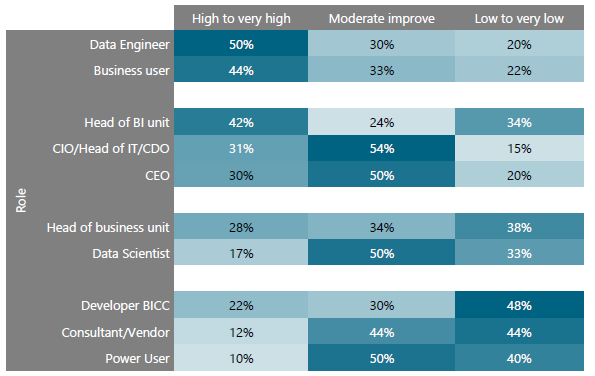The Future of BI & Analytics: Embracing Generative AI for Enhanced Insights and Efficiency
BARC has released a new report outlining the potential of Generative AI (GenAI) for business intelligence and analytics (BIA). The comprehensive analysis, titled “The Future of BI & Analytics: Adopting Generative AI for Analytics: Early Trends, Lessons, and Best Practices” provides an insight into the status quo and potential of GenAI application in BIA based on the responses of 238 data leaders and practitioners.
Generative AI has ushered in a new era of data analysis, empowering BIA teams to harness natural language for data preparation and analysis. This advancement not only amplifies productivity but also enables the exploration of more complex use cases far beyond traditional natural language processing capabilities. The surveyed leaders and practitioners shared insights into their adoption journeys, revealing the challenges and triumphs of implementing GenAI within their operations.
Expert Insights: GenAI “A Transformative Shift”
Kevin Petrie, Vice President of Research at BARC US and co-author of the report, reflects on the evolving landscape, “Generative AI is at the cusp of revolutionizing how we approach business intelligence and analytics. Its capacity to interpret and analyze data through natural language is not just an enhancement of productivity; it’s a transformative shift in how we uncover insights and make data-driven decisions. However, the path to full adoption is paved with challenges, from ensuring robust data governance to addressing the skills gap. Organizations that navigate these hurdles thoughtfully and strategically will be the ones to reap the most significant benefits.”
The findings underscore the nascent stage of GenAI adoption, with a notable uptick among organizations that have previously embraced AI and machine learning. More than one third of respondents anticipate moderate improvements in their BIA capabilities over the next 12-18 months thanks to GenAI, highlighting its potential to transform data analytics through enhanced speed, productivity, and analytical depth.
However, the journey is not without its hurdles. The report identifies critical areas of concern such as data privacy, skills gaps, and compliance challenges. Yet, these risks are deemed manageable by early adopters who are pioneering the integration of GenAI into their analytical workflows.
A Pragmatic Approach to Adoption
BARC’s analysis emphasizes the importance of a balanced and pragmatic approach to adopting GenAI technologies.
The recommendations include prioritizing easily implementable and low-risk use cases, enhancing and adapting data governance frameworks, fostering a strong data culture within the company, opting for simple deployment strategies before undertaking more comprehensive efforts to deploy analytics for unstructured and semi-structured data.

Figure: To what degree will GenAI improve the use of BIA in your organization in the next 12-18 months? (by role) (n=208)
Diverse Expectations: The Varied Outlook on GenAI across Roles
Expectations for GenAI’s impact on BIA are mixed, highlighting stark differences across roles (see figure). Data engineers and business users lead in optimism, viewing GenAI as a key to higher productivity and independence. Meanwhile, team leaders and executives show cautious optimism, aware of GenAI’s potential yet mindful of its strategic implementation. In contrast, heads of business units and data scientists express skepticism, possibly concerned about governance and the coherent use of GenAI. Developers, consultants, and power users, the most critical, question GenAI’s reliability and necessity. This spectrum of views underscores the challenge of integrating GenAI, emphasizing the need for a nuanced approach that addresses diverse stakeholder concerns.
Diverse Applications and Optimistic Outlooks for GenAI
The utilization of GenAI spans a broad spectrum of analytics functions, from predictive analytics and forecasting to data analysis, data mining, and the creation of reports and dashboards. This wide application demonstrates GenAI’s role in facilitating self-service analytics and enriching analytical outputs across various industries.
Despite the early stage of adoption, the optimism surrounding GenAI’s potential benefits is palpable among data engineers and business users, who anticipate significant productivity gains and self-service enhancements. Conversely, concerns around data governance temper the enthusiasm of business unit heads and data scientists, highlighting the nuanced perspectives across different organizational roles.
